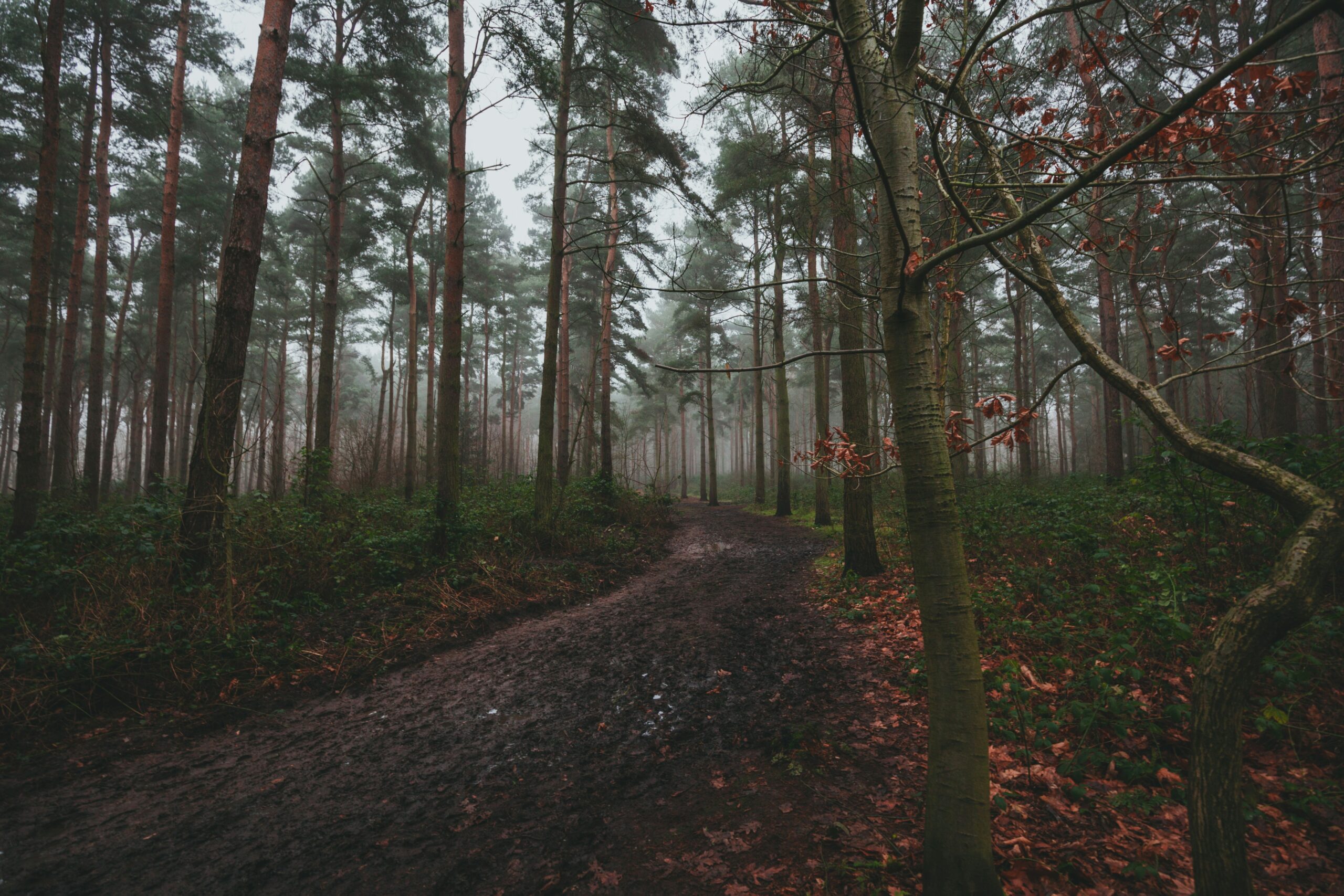Muddy footprints trailed Lottie on her way back to the porch. All that morning, rain fell, and wind played rough in the trees. Only now did glimmers of sunlight spill through crosshatches of oak branches. The air was sweet with damp grass as Lottie settled onto her front steps. Thin elbows propped behind, she watched the road and waited for what had been keeping her awake, running up a tab that would never be paid.
Then came a man with his hat in his hand like an old-time suitor. He was gray against the backdrop of green and pink springtime lush. He flickered like a hot bed of embers gnawing at lingering wood scraps.
“I’m stuck,” he told Lottie, a greeting she would have ignored if she could.
“Aren’t we all?”
She held out her hand for him as if he had asked her to dance. His thumb grazed her onyx ring as his hand solidified in hers. She saw it—the moment he had been strung from a tree by the neck. Eighty-something years ago. Well before her time.
The man’s flickering stopped. Gray drained from him and left him Black and happy. Regardless of what he had been, what he would never be now, he smiled with all his teeth and replaced the hat. Resurrection complete.
After a no-frills expression of the deepest gratitude, “Sista, I’m back,” he went on, back to the road, leaving tracks in the mud that crisscrossed and made Lottie’s own footprints indecipherable.
The dead had come to Lottie since childhood, looking for her to roll away the stone of death. Her brothers had been spared the gift, and she never learned why.
Ghosts caught Lottie deep in weeds in the not-yet-seeded part of her garden or shoveling shit in the chicken pen. They merged with her wooden fence, leaned in through her kitchen window, stumbled permeable into the tub while she bathed, or sat slumped halfway through her front door. They cried for the chance to leave behind the flickering and wash their hands of the gray. Always seeking their own Easter. They were never anyone Lottie knew—she had thought after her grandpa passed in his sleep, he might come to her, ask her to live again. But it didn’t work like that. Folks who died easily never came to her. Only the massacred ever did. Those nailed to some other crosses.
Lottie found freedom when she ventured from the two acres she had inherited from her grandparents—during the work week at her counseling job, on quick trips to the feed store, or a mindless drive fifty miles to Atlanta. Then she would miss it—the earth, the trees, and her bed of herbs.
That Friday, she went on a date to a putting range with Willie.
“You’ll never get anywhere swinging like that,” he told Lottie after her first put.
Willie was her neighbor, and one of the few lingering people in her small town who was also under the age of thirty. She liked him fine.
As she adjusted her hold, she let Willie come behind her, wrap his thick arms around her waist, and show her how to swing the club properly. It went a shorter distance than before, but Willie just seemed happy to touch her.
Later, they had beers within reach of the air conditioning. Willie got fries and a pizza to share. He ate quickly and talked to himself without realizing it.
“You’re going to give in one of these days. I know you like my company. You want to be married as much as anyone. It must get lonely in that house of yours, spending all that time on your own. Too young for that kinda living. You’re going to see you need me one of these days.”
Willie was handsome, a tall brown-skinned man with sure eyes and arms that Lottie could sink into for hours, and that was as long as she would ever need him. Willie’s place was further than a stone’s throw away, and her only neighbor beside him was a quarter mile down the road, but she was never alone. The ghosts loved on Lottie too much for loneliness. Other than the ones asking for favors, there were the ones who brought her gifts. Left hunks of quartz and magnolia blooms in her garden or piles of pecans on her front stoop. They balanced the grief with generosity, and she loved them for it.
After the date, Lottie went home to chase joy dreams. Joy, which sometimes seemed as hot-footed as a womanizer.
She strung a new hammock between two trees in the backyard. She meant it to be a fresh reason to rest. A week passed. Between work and ghosts, she didn’t use it once, but someone left a bounty of peaches from her tree in the white netting. She asked no questions. She was happy not to have to pick the peaches herself.
She had placed a fresh pie in the oven when a ghost woman with a ghost baby strapped to her chest appeared in the kitchen and screamed loud enough to deafen.
The woman with the baby grabbed Lottie’s arm without permission. Then the baby and the woman began to re-swell into hard being.
In a flash, the memory came, a fire in a brownstone. The firefighter crested a hallway edged in flames. He seemed to see her there trapped behind a hutch sprouting a wall of fire, separating woman and baby from help. No sight of the father or anyone else. The whole world was deep in an orange glow. Then, the firefighter shook his masked head and left them both to burn.
“Why did he leave you?” Lottie wanted to ask when the kitchen became clear to her again, but the woman did not stick around. No “thank you” followed before she took her baby and exited through the screen door with a frown that said she wasn’t satisfied and probably never could be.
Lottie forgot to take the peach pie out of the oven, so it burned while she was overcome by the phantom look of the firefighter’s helmet when he had decided mother and child were not worth the risk of trying to save. The visions were a tough cost to manage, a price like a pound of flesh—jerked, smoked, or charbroiled.
Lottie didn’t smell the smoke until Willie came banging on the front door to alert her. The pounding snapped her back to the present. She snatched the pie from the oven and dropped it in the sink before she went to meet his eager yelling.
“What is with all the noise?” she asked him.
“Noise?” He let out a huff. “Woman, I thought you were in her barbecuing your fool self. You didn’t hear that fire alarm screaming halfway down the road?”
Lottie hadn’t even realized it was beeping, but she went and grabbed a throw pillow quickly with Willie on her heels. She fanned the smoke detector while he lectured her close behind.
“You need someone here,” he said. “You better realize it before it’s too late.”
He went on as he usually did. It bugged Lottie half to death. He didn’t see that all the yapping he hurled at her about being lonely and wanting marriage applied to himself ten times over. She was twenty-seven, which she guessed was a good marrying age, but no part of her dreamed of white dresses and wedding rings. Just crosses, flowers, and mud.
After the alarm quieted, Lottie thanked Willie for the help and shooed him right back out the front door, though he protested.
Thoughts of the woman and the baby stuck around. Other ghosts had told a similar story. Firefighters of a certain time sometimes did that. Appraised the victims they were meant to save. Played God. Left some folks to die. A woman in a wheelchair told it. A man who was blind told it the same; he had heard the words, “Leave him,” right before he lost any sense of his feet. A girl of fourteen with round, doughy cheeks hadn’t said anything of the sort, but it was there in the vision. The truth always was.
Sunday night, Lottie’s brother Jason and his wife Evelyn came by the house for dinner, a continuation of a tradition from when their grandparents were still alive.
Lottie served them roast chicken and potatoes, store bought. She had used up all her creative energy reanimating the dead, and any extra energy had gone to loving on Willie and almost burning down her house.
Jason always said the grace—Jesus, thank you for our food—and ate with gratitude. Evelyn ate more than usual. She seemed to like Lottie’s cooking best when it came from a store.
Lottie caught Jason looking at her more than once with a sort of questioning glance. Same way he had been looking at her since they were kids, when she first told him and their big brother about the ghosts. As the youngest of the three, Jason was always more optimistic, so Lottie had never been able to tell him the whole of it. It wasn’t clear if he or their brother even believed her anymore. They treated it all serious although not too serious. Something about Lottie’s master’s in social work and steady employment must have convinced them that whatever she believed, she was capable of surviving on her own. It had been enough for them to sign over their portions of their grandparents’ deed.
“Can we tell her now?” Evelyn asked out of the sobering blue.
It had been a long moment of Lottie and Jason exchanging one of the looks they had been sharing all the decades of their lives.
“Tell me,” Lottie said, happy for the distraction and expecting another announced trip to Paris or Japan.
Evelyn took Jason’s hand and slowly pushed away the glass of wine Lottie had set in front of her.
“We’re pregnant!” Evelyn said.
Lottie saw fire, rope, and trees, but she smiled.
“That’s wonderful,” she said and meant it. She got up to hug Evelyn and then hug her brother.
“You’ll be the best auntie,” Jason said.
Lottie would have said something similar if it hadn’t been for the screams, cracking edges in her brain. She tried not to let on about it, but she was eager for the moment Jason, Evelyn, and their growing family retreated down the driveway in their cute SUV and left her to her own troubles.
The rains returned that night as she tossed table scraps to the hound that would often hang around her yard. The hound seemed to know that Lottie cared, even when she swore that she didn’t. He came back whenever he was in need, and she never turned him away.
“This is all I got,” she said of the store-bought chicken carcass left over from dinner.
The dog took the bones in its snout just as the first bolt of lightning cut the clouds and hit the ground hard enough to knock Lottie off her feet. The hound yelped like it had been struck, dropping its bounty and bounding up the road.
As the dog ran scared, Lottie pulled herself to her feet and looked over to Willie’s. Like hers, his house was ranch-style with wood siding and a sharp pointed roof. From her porch, she could see a light on in his garage. The rest of the house was shrouded by distance and trees.
This was the real cost of everything. The South had anguish enough for Lottie and the whole world, so many crosses.
She loved Willie, really and truly, but she knew eventually it would be too late, and she had made her peace with that. She hoped he would find a normal woman, a lucky woman.
Before Lottie could get her front door closed good, she realized her power was off. She lit a candle and sat at her kitchen table with a glass of water.
Such deep sadness had been chasing her. Deep in her head, where she thought she was safe, something had been calling her name at first daylight, singing to her during meals, and drowning her in curses and cusses in the thick of night.
She felt certain whatever had been chasing her would find her that night. She thought of calling Jason so he could tell her more about the baby, his and Evelyn’s plans for the nursery, pretty words, but it was only a thought as she turned the water glass in circles.
“I’m here if you want me,” Lottie said. “Come on here.”
She had no reason to be scared. The ghost would come. She would bring it back to life. It would leave. This had been her burden for as long as she could remember. It was heavy enough to break a weaker back, but Lottie was used to holding up small worlds.
The rain picked up outside. Lightning snapped electric blue behind the blinds.
Then there was the voice in her head, calling to her clearer than it ever had before.
“Save me,” it said.
“Think I’m trying,” Lottie said back.
There was nothing out of the ordinary in the kitchen shadows, but crashing came from the next room, and her heart did a thing it hadn’t done since she was ten and running to sleep in Jason’s bed. It skipped, plummeted, and hammered like a beatbox.
She rose from the table, sure she could meet this head-on as she had with everything else.
“You got to come to me,” she said.
Lottie wondered about the only other woman she knew of who’d seen death undone. She knew that there had to be other Marys with other names that a public school system wouldn’t teach. She knew that all the Marys would have had something to say about the South.
Crashing commenced again, this time in the dining room, a rumble like a fistfight across wood furniture.
“Behave,” Lottie commanded.
It did no good. Red flickering started in the bathroom at the end of the hall. She went toward it, ready to set her little world right again. Then she might go spend some time somewhere the ghosts wouldn’t find her. Paris or Japan. She always knew she could leave. She had just never wanted to until that moment.
By the time her shoes touched the bathroom tile, the red had disappeared, and Lottie was again in the dark. She watched the shadows, listened as something pounded on the front door. Willie probably. Something else, maybe. The storm outside seemed to shake the house down to the baseboards. An ambulance sounded in the distance. Then, in the mirror, she saw herself flickering red, like embers claiming the last bit of wood, and if her electricity ever returned, she would see plainly that the brown in her skin had been replaced with gray.




